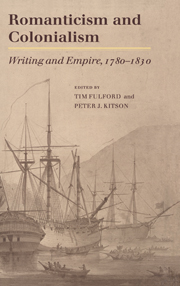Book contents
- Frontmatter
- Contents
- Notes on contributors
- Acknowledgements
- 1 Romanticism and colonialism: texts, contexts, issues
- 2 Romanticism and colonialism: races, places, peoples, 1785–1800
- 3 Romanticism and colonialism: races, places, peoples, 1800–1830
- 4 Accessing India: Orientalism, anti-‘Indianism’ and the rhetoric of Jones and Burke
- 5 ‘Sunshine and Shady Groves’: what Blake's ‘Little Black Boy’ learned from African writers
- 6 Blood Sugar
- 7 ‘Wisely forgetful’: Coleridge and the politics of Pantisocracy
- 8 Darkness visible? Race and representation in Bristol abolitionist poetry, 1770–1810
- 9 Fictional constructions of Liberated Africans: Mary Butt Sherwood
- 10 ‘Wandering through Eblis’; absorption and containment in Romantic exoticism
- 11 The Isle of Devils: The Jamaican journal of M. G. Lewis
- 12 Indian Jugglers: Hazlitt, Romantic Orientalism, and the difference of view
- 13 ‘Some samples of the finest Orientalism’: Byronic Philhellenism and proto-Zionism at the time of the Congress of Vienna
- 14 ‘Once did she hold the gorgeous East in fee…’: Byron's Venice and Oriental Empire
- 15 The plague of imperial desire: Montesquieu, Gibbon, Brougham, and Mary Shelley's The Last Man
- Index
4 - Accessing India: Orientalism, anti-‘Indianism’ and the rhetoric of Jones and Burke
Published online by Cambridge University Press: 20 August 2009
- Frontmatter
- Contents
- Notes on contributors
- Acknowledgements
- 1 Romanticism and colonialism: texts, contexts, issues
- 2 Romanticism and colonialism: races, places, peoples, 1785–1800
- 3 Romanticism and colonialism: races, places, peoples, 1800–1830
- 4 Accessing India: Orientalism, anti-‘Indianism’ and the rhetoric of Jones and Burke
- 5 ‘Sunshine and Shady Groves’: what Blake's ‘Little Black Boy’ learned from African writers
- 6 Blood Sugar
- 7 ‘Wisely forgetful’: Coleridge and the politics of Pantisocracy
- 8 Darkness visible? Race and representation in Bristol abolitionist poetry, 1770–1810
- 9 Fictional constructions of Liberated Africans: Mary Butt Sherwood
- 10 ‘Wandering through Eblis’; absorption and containment in Romantic exoticism
- 11 The Isle of Devils: The Jamaican journal of M. G. Lewis
- 12 Indian Jugglers: Hazlitt, Romantic Orientalism, and the difference of view
- 13 ‘Some samples of the finest Orientalism’: Byronic Philhellenism and proto-Zionism at the time of the Congress of Vienna
- 14 ‘Once did she hold the gorgeous East in fee…’: Byron's Venice and Oriental Empire
- 15 The plague of imperial desire: Montesquieu, Gibbon, Brougham, and Mary Shelley's The Last Man
- Index
Summary
The extent to which Edward Said found himself ‘enslaved to an ideological construct of his own design’, utilizing an all-encompassing ‘Occidentalism’ to essentialize and indict the West where ‘every European, in what he could say about the Orient, was consequently a racist, an imperialist, and almost totally ethnocentric’ has reinforced the need to produce discriminating and nuanced readings of Orientalism and the production of Orientalist knowledge. Said adopts the very discursive structures which he anathematizes; he decries rigidity and the imposition of generalization, only to produce a concept of Orientalism as a sinister, singular, and transhistorical ‘discourse’, accommodating in one totalizing sweep Aeschylus, Victor Hugo, Dante and Karl Marx.
By contrast with such a unitary construction, this chapter seeks to demonstrate the complex, diverse, and changing specificities of Orientalism by investigating the techniques of representing India employed by two friends and fellow members of Johnson's Turk's Head Club, Edmund Burke and Sir William Jones, from the discrete perspectives of metropolitan Westminster and colonial Calcutta in the mid 1780s. Their friendship was to be broken by their divergent estimates of the career and character of Warren Hastings, the Governor-General of Bengal, whom Jones was to invite to be a President of his newly-formed Asiatick Society and Burke was to impeach.
In the years before Sir William Jones's 1783 departure for the Supreme Court bench of Calcutta, Burke had consulted him repeatedly on various East India Bills.
- Type
- Chapter
- Information
- Romanticism and ColonialismWriting and Empire, 1780–1830, pp. 48 - 66Publisher: Cambridge University PressPrint publication year: 1998
- 10
- Cited by

